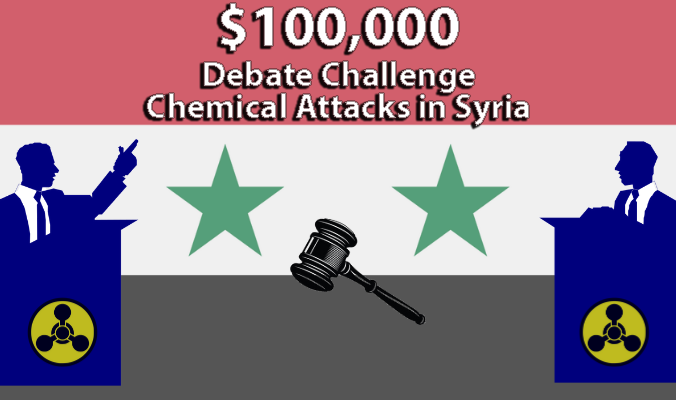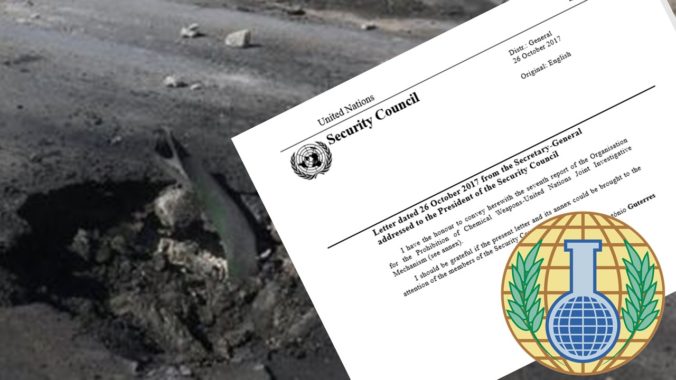Among the many atrocities of the Syrian Civil War, the one that stood out was the use of chemical weapons, and particularly the nerve agent sarin.
While there is general agreement that there were multiple sarin attacks, most of the Western population has accepted that the attacks were carried out by the Syrian government. This assumption is so entrenched that objections to it are widely considered to be “conspiracy theories”.
Rootclaim, however, examined the evidence using a probabilistic analysis, and the calculated conclusion revealed that it is much more likely that opposition forces were at fault.
Most of Rootclaim’s conclusions on other issues later became the consensus opinion, despite some initial pushback. Since this has yet to happen with regard to the sarin attacks in Syria, we decided to issue an open $20,000 challenge to debate anyone on this matter. This challenge has gone unanswered since April 2018, and we are now presenting it here in more detail, and increasing the bounty to $100,000. By doing so we hope to demonstrate the superiority of reasoning methods that integrate honest consideration of multiple hypotheses, unbiased analysis of evidence, and probabilistic inference.
Update: In June 2021, a video of opposition fighters launching rockets was matched to a field within opposition controlled territory, and that field has been shown to be at the intersection of seven rocket trajectories calculated from images of the impact sites. With this additional evidence we now consider the issue closed, demonstrating again the superiority of Rootclaim’s methods. While the $100,000 challenge is still available, we don’t expect anyone to apply.
The challenge
Win a debate with a Rootclaim team member about the sarin attacks in Syria and take home $100,000. See our Rootclaim Challenge page for additional topics.
The debate
Who carried out the sarin attacks during the Syrian civil war?
- Rootclaim will argue that opposition forces were responsible.
- Will anyone defend the commonly accepted hypothesis that the Syrian government was responsible?
This is the conclusion reached by the US government, Britain, France, and the joint investigation by the United Nations and OPCW (Organization for the Prohibition of Chemical Weapons).
Do you have another hypothesis (e.g. Russia did it, or that some attacks were by the Syrian government while others were by the opposition)? Write to us and we’ll consider it.
The stakes: $100,000 each
This is the first in a series of Rootclaim Challenges, modeled after projects such as James Randi’s million dollar challenge, offered to anyone who can demonstrate paranormal powers in a lab setting (all attempts failed). To deter repeated submissions with the intention of winning by luck, we require the challenger to risk the same amount. Applicants who can’t afford to risk $100,000 are encouraged to pool funds together or even crowdfund it. We are willing to reduce the stakes as low as $10,000 for applicants already involved in public debate on the issue.
The motivation here is not to make money, but to elevate the level of public discourse (read about how challenges like this may help people reevaluate their positions, something that never happens in a heated online exchange).
Format
Both sides will first agree on two judges with strong analytical skills, relevant experience, no previous endorsement of either side, no relevant political biases, and who declare they will examine both hypotheses equally.
Choosing judges will be done publicly on Twitter, so evasion attempts by either side, such as offering biased judges, are exposed. As an example of our honest approach to this process, in a past discussion, when Nassim Taleb offered Glenn Greenwald as a judge, we agreed to bend the rules and accept him, even though he previously said there is “overwhelming” evidence the government is responsible (contrary to Rootclaim’s conclusion) – because we think he is capable of changing his mind when presented with evidence.
Each side will have 8 hours in total to present its case, including time to respond to the other side’s claims, as part of a two-day event.
The debate will be based on all currently available evidence. The goal here is not to trip up or trap the opponent, but to determine which hypothesis is better supported by the evidence. If you have new evidence, or evidence we overlooked, it should first be shared, so we can update the analysis, and if it doesn’t significantly change the conclusion, the challenge can be accepted. We are not claiming to have better evidence, but rather aim to demonstrate the superiority of probabilistic reasoning over human reasoning, when evaluating the same evidence.
Each judge has to declare which of the two hypotheses is more likely. If both agree, the prize pool, minus the debate expenses, is paid to the winner. Otherwise, it is split.
We are flexible – feel free to contact us with offers.
Who declined so far?
The following people have been sent a tweet offering to participate in the challenge but declined or failed to respond. All of them have publicly expressed very high confidence that the Syrian government is responsible.
- Eliot Higgins – Founder of Bellingcat.
- Brian Whitaker – Journalist and former Middle East editor of The Guardian.
- Chris York – Senior editor of Huffington Post UK.
- Josie Ensor – Middle East correspondent for The Telegraph.
- Scott Lucas – Editor of EA WorldView and Professor at University of Birmingham.
- Richard Hall – Middle East correspondent for The Independent.
- Julie Leranz – Senior adviser at The Israel Project and a director at The Human Security Centre.
- Kristyan Benedict – Amnesty International UK Campaigns Manager.
- Dan Kaszeta – Security and CBRN specialist and writer for Bellingcat.
- Tobias Schneider – Research fellow at Global Public Policy Institute (GPPi).
- Gregory Koblentz – Director of Biodefense Graduate Program at George Mason University.
- Numerous other individuals who were very active on social media discussing this issue.
Have you notified anyone of the challenge and they declined it? Let us know and we’ll add them to the list.



Recent Comments